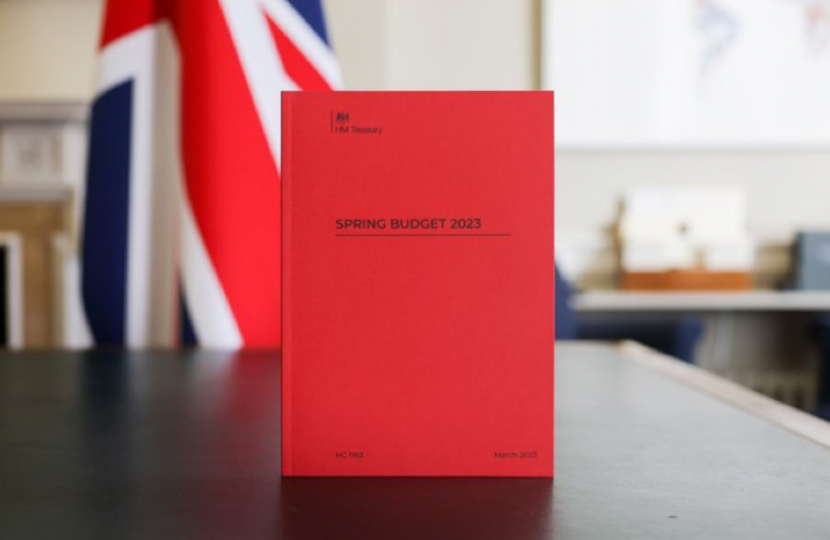
The East of England is set to benefit from the Conservative Government’s Spring Budget 2023, which delivers on the Prime Minister and Chancellor’s priority to halve inflation, reduce debt and grow the economy.
The Chancellor’s Spring Budget tackles the two biggest issues the UK economy faces – getting investment into the economy and filling one million job vacancies, by creating more opportunities for work across every region in the UK.
The Spring Budget 2023 sets out the Conservative Government’s plan for growth by delivering the Chancellor’s four pillars – Enterprise, Employment, Education and Everywhere.
Tax Cut for Business
- With a £25 billion investment tax cut at its heart, this Budget sets out how the Government will create jobs and secure economic growth by backing UK businesses.
The Spring Budget 2023 confirms full-expensing which offers 100% first-year relief on new qualifying investments in main rate plant and machinery from 1 April 2023 until 31 March 2026. For every pound a company invests, their taxes are cut by up to 25 pence – this puts £25 billion back into the economy over the next three years.
It will mean the UK has the lowest headline rate of Corporation Tax in the G7 and the most generous capital allowances in the OECD.
Across the UK
- Bringing more investment to the East of England to create new jobs and grow the economy.
Thanks to the Conservative Government the East of England will see two regeneration projects, backed by £11 million through the Levelling Up Regeneration Projects and two Community Ownership Fund projects funded, backed by £387,000 through the Community Ownership Fund. These new projects will create jobs across the area and restore pride by delivering on local priorities.
The Chancellor also committed £27.4 million across the East of England to fix 550,000 potholes, increasing road safety for motorists.
Recognising the vital role our hospitality sector plays in growing the economy, the Draught Relief announced at the Budget will benefit 3,365 venues across the East of England and help our pubs to prosper.
The Conservative Government have set the mission that, by 2030, every part of England that wants a devolution deal will have one. They have made progress on this including across the East of England, empowering local leaders to deliver for their local communities by securing a deal in 2022.
Cost of Living Support for Families
- The Conservative Government have today confirmed the amount of cost of living support in place between 2022-24 has reached £94 billion – an average of £3,300 per household.
- The Conservative Government is extending the Energy Price Guarantee at £2,500 for a further three months, saving households an additional £160 and bringing the total Government support for energy bills to £1,500 for a typical household since October 2022.
- Today’s announcement builds on the extensive support in place for vulnerable households – such as £900 Cost of Living Payments for eight million families on means-tested benefits.
The Chancellor also announced the end to the premium paid by over four million households using prepayment meters across the UK. This will be achieved through adjusting the EPG from 1 July to bring prepayment-metered customers in line with the EPG until it ends in April 2024.
Today’s EPG extension builds on the generous cost of living support confirmed at the Autumn Statement 2022. This includes up to £1,350 of support for households in 2023-24: £900 for households on means-tested benefits; £300 for pensioner households and £150 for disability benefit claimants. The Autumn Statement 2022 also confirmed a boost to the Household Support Fund, bringing the fund to over £2.5 billion.
The Chancellor also announced fuel duty will be frozen for a thirteenth consecutive year, saving the average driver around £200 since the 5 pence cut was introduced.
Childcare Reform
- The Chancellor extended the provision of 30 free hours of childcare a week to all working parents of children aged 9 months until they start school – helping more parents take on the work that is right for them.
- Reforms also include increasing the hourly rate paid to nurseries, paying Universal Credit claimants their childcare entitlement upfront, rather than in arrears and increasing the maximum entitlement to £950 for one child and £1,629 for two children – helping more Universal Credit claimants into work.
This will deliver the biggest shake-up in childcare provision since 2017, helping more people across Castle Point with the cost of living and into work to grow our economy. These reforms will deliver for 1,002 families across Castle Point with children aged 9 months to 4 years old.
Working parents of 2-year-olds can access 15 hours per week from April 2024 and from September 2024 all working parents of children aged 9 months to 3 years old can access 15 hours per week. From September 2025 all working parents of children aged 9 months to 3 years old can access 30 hours of free childcare per week.
The reform includes increasing the hourly rates paid to providers of free childcare to £204 million next year, increasing to £288 million by 2024-25, introducing market reforms to the sector by changing ratios for 2-year-old ratios from 1:4 to 1:5 and allowing childminders to care for more than three children under five if some children are siblings, or their own child.
The package also introduces a childminders grant to support childminders with start-up costs, incentivising more talented childcare providers to the sector. This amounts to £600 for individual applicants and up to £1,200 for applicants who apply through a childminder agency.
Rebecca Harris MP commented:
“I am pleased the Chancellor has announced a tax cut for businesses, rewarding investment and encouraging businesses to grow their enterprise. When businesses prosper, they invest more in the UK and employ more staff – both of which are vital to our mission to halve inflation, grow the economy and reduce debt.
“I welcome the Government’s investment in East of England, creating new jobs and economic growth in our area. By helping families with the cost of living and making childcare more accessible for parents, more people can get to work to help grow our economy.”
Commenting, Chancellor of the Exchequer Jeremy Hunt said:
“We are working hard to deliver on our priorities to halve inflation, grow the economy and reduce debt so we build a stronger and more innovative economy that will guarantee a better future for the next generation.
“This Budget tackles the two biggest issues the UK economy must overcome to grow – getting investment into our economy and filling one million job vacancies.
“It does this by delivering the four pillars – Enterprise, Employment, Education and Everywhere.”
For more information on the Spring Budget 2023, please visit: https://www.gov.uk/government/publications/spring-budget-2023. You can also read the Chancellor’s speech in full at: https://www.gov.uk/government/speeches/spring-budget-2023-speech.

